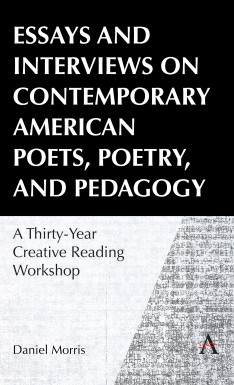Essays and Interviews on Contemporary American Poets, Poetry, and Pedagogy
A Thirty-Year Creative Reading Workshop
By Daniel Morris
- About This Book
- Reviews
- Author Information
- Series
- Table of Contents
- Links
- Podcasts
About This Book
In sixteen chapters devoted to avant-garde contemporary American poets, including Kenneth Goldsmith, Adeena Karasick, Tyrone Williams, Hannah Weiner, and Barrett Watten, prolific scholar and Purdue University professor Daniel Morris engages in a form of cultural repurposing by “learning twice” about how to attend to writers whose aesthetic contributions were not part of his education as a student in Boston and Chicago in the 1980s and 1990s when new formalism and post-confessional modes reigned supreme.
Morris’s study demonstrates his interest in moving beyond formalism to offer what Stephen Fredman calls “a wider cultural interpretation of literature that emphasizes the ‘new historicist’ concerns with hybridity, ethnicity, power relations, material culture, politics, and religion.” Essays address from multiple perspectives—prophetic, diasporic, ethical—the vexing problems and sublime potential of disseminating lyrics—the ancient form of transmission and preservation of the singular, private human voice across time and space—to an individual reader, in an environment in which e-poetry and digitalized poetics pose a crisis (understood as both opportunity and threat) to traditional page poetry.
Reviews
“Daniel Morris has been a leading critic of contemporary American poetry for decades. This collection of his work reasserts his leadership in the field and does much more than that. As Morris’s personal reflection on the work of his career, this collection shows how Morris thinks and teaches. I have been learning from Daniel Morris for many years, and this book reminded me why. It’s a richly satisfying whole that exceeds the sum of its parts.” — Leonard Cassuto, author of Academic Writing as if Readers Matter
“With engaging self-awareness about the contradictions, tensions, strength, and foibles of his own morphing subject position(s) in relation to contemporary poetry and poetics, Daniel Morris embraces a wide array of topics and aesthetics from the mainstream (Kathleen Spivak, Louise Glück) to the esoteric (Daniel Y. Harris, Adeena Karasick) with literary verve and scholarly insight.” — Maria Damon, Full Professor of Poetry Studies, Pratt Institute, United States
“Drawing on his extensive experience as a scholar, teacher, and poet, Daniel Morris provides insights on a wide-ranging group of writers not usually discussed together in one volume, including “secular Jewish” poet Louise Glück, “Language writer” Barrett Watten, and contemporary innovator Tyrone Williams. Especially welcome are Morris’s reflections on teaching different genres, from the relationship of graphic novels to modern and contemporary poetry, resisting trends in teaching introductions to poetry, and understanding Amiri Baraka’s play “Dutchman.” This book will appeal to readers wanting to know more about American literary history and contemporary poetry, teachers at various levels, and to poets themselves.” — Kathy Lou Schultz, Professor of English, University of Memphis, United States
“In this autobiographical yet encyclopedic book, Daniel Morris gives us the inside story on a century and more of poetry and poetics: Why, for instance, is a high priestess of lyric poetry like Louise Glück considered a midrash cousin of Bob Dylan? Morris’s readers will wake up wiser the following morning.” —Michael Collins, Professor of English, Texas A&M University
“The organizing principle behind Morris’s often idiosyncratic exegeses is Morris himself. This deeply informed collection—literary, pedagogical, and personal—is an invaluable record of a prolific, prodigious scholar, an accomplished poet, and educator admired by his Purdue students. Analytical and personal, Morris’s unique insights, especially in dissolving categorical distinctions between art and poetry, elevate us all.” —Burt Kimmelman, Distinguished Professor of Humanities, NJIT
“The opening chapter of Daniel Morris’s book presents a wide-ranging account of his journey as a poet-critic. By mapping his personal development onto the history of postwar verse, Morris offers real insights into the work of canonical American writers, as well as his own reflections on the art of poetry.” —Dr. Florian Gargaillo, Associate Professor, Dual Enrollment Coordinator, Department of Languages and Literature, Austin Peay State University; President, Wallace Stevens Society
Author Information
Daniel Morris is Professor of English at Purdue University, USA.
Series
Table of Contents
Acknowledgments; Introduction: To Teach Is to Learn Twice (or, Putting the Pieces of My Life’s Work Together); SECTION 1: Rereading the Poets, Poetry, and Poetics of My Decade in the Boston Area (1983–1993); CHAPTER 1 Reading Spivack/Reading Myself: A Memoir of Reading a Memoir, Boston 1959–1977; Boston 1983–1993; CHAPTER 2 Allen Grossman’s Radical Simplicity; CHAPTER 3 In Praise of Secular Jewish American Lyric Commentary: Why Bob Dylan and Louise Glück Are Twenty-First-Century Nobel Laureates; CHAPTER 4 Preserving William Carlos Williams: Populism, Curation, and Late AvantGardism in Kenneth Goldsmith’s Duchamp Is My Lawyer and Thomas Lux’s “Refrigerator, 1957”; SECTION 2: Midwestern Avant-Gardism: Essays and Interviews on Experimental Poetics; CHAPTER 5 No Sympathy for the Devil of History: On Norman Finkelstein’s “Oppen at Altamont”; CHAPTER 6 History and/as Language Poetry: Remembering Literary Community through Negation in Barrett Watten’s Questions of Poetics; CHAPTER 7 Tyrone Calling: Torqued Language Poetry and Radical Mimesis in c.c.; CHAPTER 8 An Interview with Patrick Durgin about Hannah Weiner; CHAPTER 9 Tech Support Says “Dead Don Walking”: Tradition, the Internet, and Individual Talent in the Poetry of Daniel Y. Harris; CHAPTER 10 Interview with Adeena Karasick on Checking In; SECTION 3: To Teach is to Learn Twice: Poetry, Poetics, and Pedagogy; CHAPTER 11 Convergence Cultures: Modern and Contemporary Poetry and the Graphic Novel; CHAPTER 12 Resisting Billy Collins: On Teaching “Introduction to Poetry” in Introduction to Poetry; CHAPTER 13 Amiri Baraka’s Aesthetic Radicalism: Dutchman’s Modernist Roots; CHAPTER 14 Two Interviews with Thomas Fink; SECTION 4: In My End Is My Beginning: Reviewing Peter Dale Scott and Philip Guston; CHAPTER 15 Reviewing Peter Dale Scott/Reviewing Myself; CHAPTER 16 In My End Is My Beginning: Seeing Double at Philip Guston Now in the Summer of 2023; Conclusion: Goodbye, Heavilon Hall; Index
Links
Stay Updated
Information
Latest Tweets



